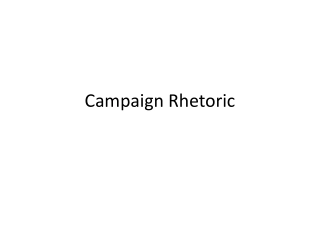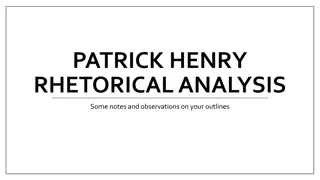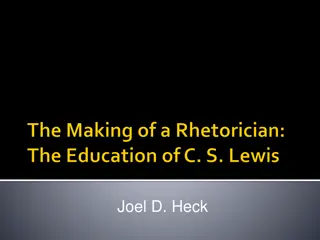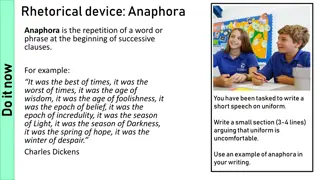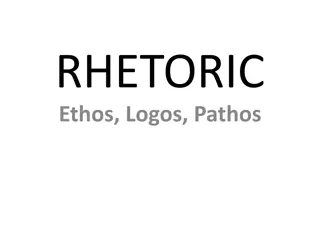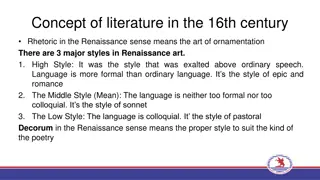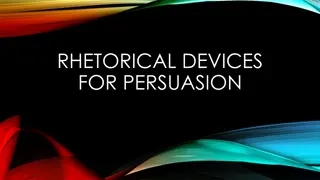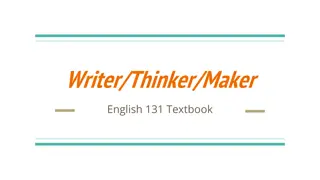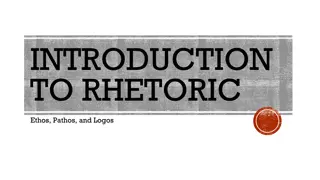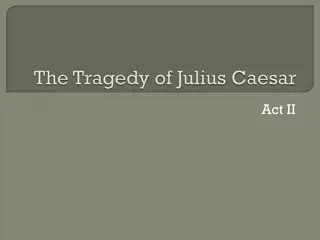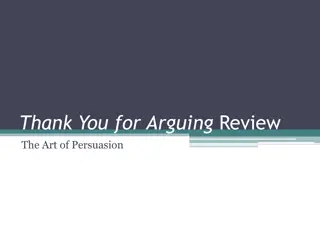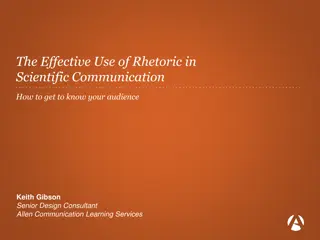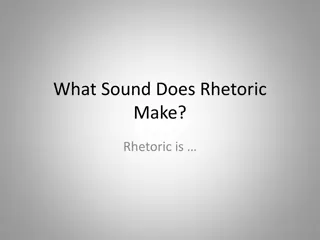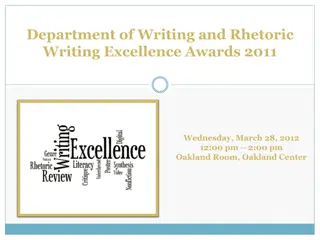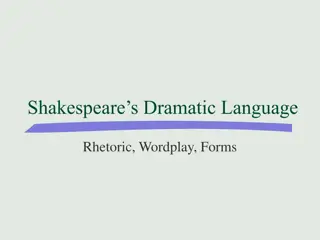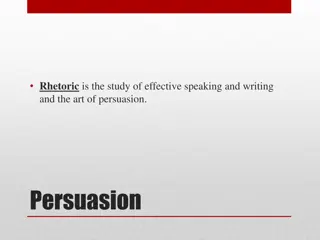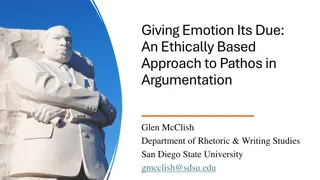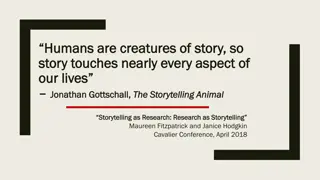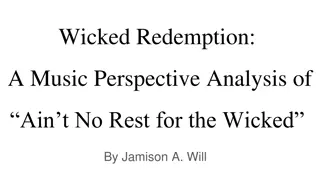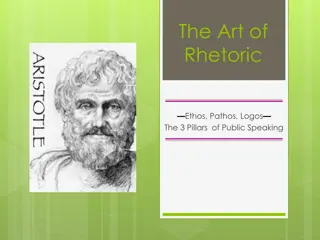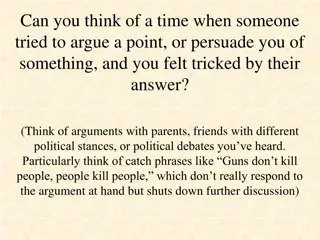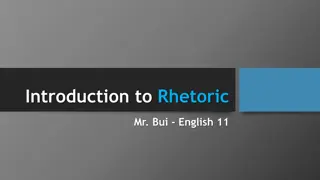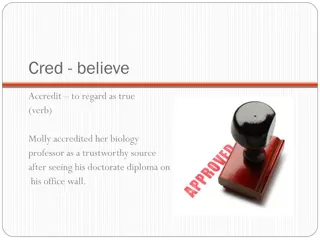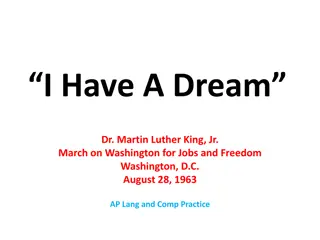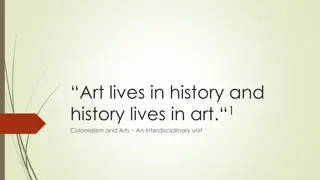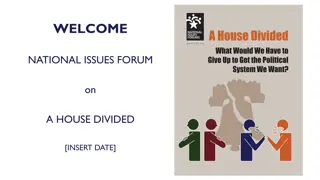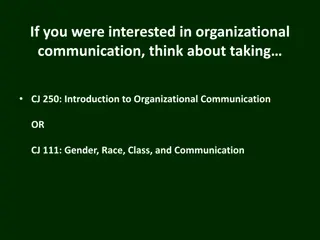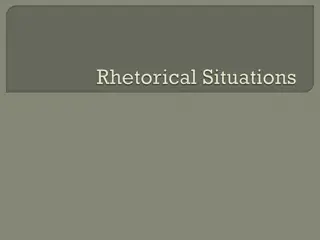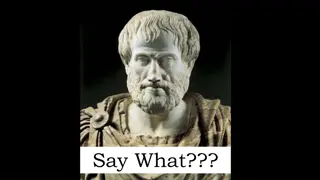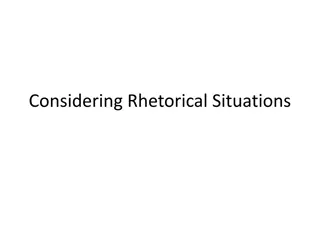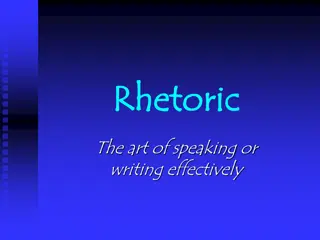Campaign Rhetoric
Rhetoric, the art of persuasive language use, plays a crucial role in political campaigns, focusing on public speaking to sway audience opinions. The ethical implications, such as the use of noble ideas versus dishonest strategies, are also key considerations. Factors affecting persuasiveness includ
0 views • 51 slides
Analyzing Patrick Henry's Rhetorical Strategies
Explore the effective use of rhetoric by Patrick Henry in his speech to ignite rebellion during the American Revolution. The analysis focuses on his use of allusion, metaphor, and powerful language to convince delegates to engage in war against England.
0 views • 8 slides
Influential Educators: Joel D. Heck, Flora Hamilton Lewis, and Beatrix Potter
Explore the educational journeys of Joel D. Heck, Flora Hamilton Lewis, and Beatrix Potter, from their academic backgrounds to their deep thoughts on education and rhetoric. Discover the impact of influential figures like Harry Wakelyn Smith and the profound influence of MacDonald's book "Phantastes
1 views • 33 slides
Mastering Rhetorical Devices in Speech Writing
Explore the art of rhetoric through various devices like anaphora, epizeuxis, anadiplosis, diacope, and chiasmus. Practice incorporating these tools in persuasive speeches on topics ranging from uniforms to banning computers, showcasing your mastery of eloquence.
0 views • 8 slides
Understanding Rhetoric: Ethos, Logos, Pathos in Persuasion
Rhetoric explores the art of persuasive communication, emphasizing three key components: Ethos (credibility), Logos (logic/facts), and Pathos (emotion). Understanding the three types of rhetoric and persuasive appeals can enhance one's ability to craft compelling arguments. Through examples, student
0 views • 10 slides
Literature in the 16th Century: Styles, Patronage, and Poetry Traditions
Explore the concept of literature in the 16th century, focusing on rhetoric in the Renaissance, major styles in art, the role of courtiers and patrons, poetic traditions like heroic, Ovidian, pastoral, and sonnet, and delve into the analysis of Sir Thomas Wyatt the Elder's poem "The Long Love that i
0 views • 4 slides
Mastering Rhetorical Devices for Persuasion
Understand the art of rhetoric and the power of persuasion through ethos, pathos, and logos. Explore how writers use varying techniques like formal word choice, emotional appeal, and allusion to sway audiences. Delve into the persuasive appeals of ethos, pathos, and logos as explained by Greek philo
0 views • 12 slides
The Art of Rhetoric and Persuasion: A Journey from Greece
The history of rhetoric and the concepts of persuasion trace back to ancient Greece with prominent figures like Aristotle and Plato. Aristotle's book, "The Art of Rhetoric," introduced the three methods of persuasion - Pathos, Logos, and Ethos. Pathos appeals to emotions, Logos involves logic and re
0 views • 25 slides
Canada's Path Towards Broad Access to Medical Assistance in Dying
Overview of Canada's developments and safeguards in Medical Assistance in Dying (MAID), including key criteria, other safeguards, rhetoric post-Carter decision, and the impact of Truchon v. Canada AG. The introduction of Bill C-7, featuring a 2-track system for different patient scenarios, is discus
6 views • 12 slides
Unveiling the Intricacies of Schemes and Tropes in Stylistics
Schemes and Tropes in classical rhetoric play a vital role in enhancing written and spoken language by deviating from literal expressions. These stylistic devices, known as figures of speech, add depth, beauty, and emotional intensity to communication. Schemes involve repetitions of expression, whil
0 views • 19 slides
English 131 Textbook: A Comprehensive Guide to Writing, Reading, and Argumentation
This English 131 textbook is divided into six parts focusing on various aspects of writing, reading, and argumentation. It covers defining rhetoric, genre awareness, reading skills, conducting research, argumentation, and strategies for drafting and revising. The textbook provides tools and resource
0 views • 4 slides
Understanding Rhetoric: Ethos, Pathos, Logos
Rhetoric is the art of persuasive communication in various contexts. It involves utilizing ethos (credibility), pathos (emotions), and logos (logic) to influence the audience. Distinguishing between argument and persuasion, this communication form employs elements such as organization patterns, appe
4 views • 18 slides
Comparative Study of Apprenticeship Systems in England, Finland, and France
This comparative study explores the rhetoric and reality of apprenticeship systems in England, Finland, and France for 16-18 year-olds. It delves into the policy motivations behind researching apprenticeships and examines the roles of employers within these programs. The study also defines apprentic
3 views • 13 slides
Understanding Rhetoric and Characterization in Shakespearean Works
Delve into the realm of rhetoric, exploring the concepts of logos, pathos, and ethos alongside the art of persuasion through language. Uncover the nuances of blank verse in Shakespearean poetry and the significance of characterization in revealing the depths of characters in his plays.
7 views • 32 slides
Mastering the Art of Persuasion: A Review of "Thank You for Arguing
Explore the world of persuasion through the insightful chapters of "Thank You for Arguing." Unveil the power of rhetoric and sharpen your skills in influencing others. From understanding argument strategies to setting effective goals, this book is your guide to becoming a persuasive communicator.
1 views • 83 slides
The Rhetoric of Death in Central Appalachia: A Case Study in Rhetorical History
Explore the role of rhetoric in Central Appalachia's material culture through traditional gravestones, studying beliefs and values using artifacts, semiotics, and the evolution of cemetery symbolism over time. Discover how codes on graves convey messages on death and grief within the Appalachian con
0 views • 9 slides
Mastering Rhetoric in Scientific Communication
Understanding and utilizing rhetoric effectively in scientific communication is essential for engaging audiences. By knowing your audience, employing Aristotelian reasoning, and building metaphors, you can enhance the impact of your message. Additionally, storytelling plays a crucial role in captiva
0 views • 22 slides
Understanding the Art of Rhetoric
Explore the diverse perspectives on the concept of rhetoric, ranging from Plato and Aristotle to modern thinkers like Henry Ward Beecher and Andrea Lunsford. Rhetoric is depicted as the art of persuasion, with various scholars defining it as enchanting the soul, discovering means of persuasion, or i
1 views • 13 slides
Department of Writing and Rhetoric Writing Excellence Awards 2011
The Department of Writing and Rhetoric at Oakland University organized the Writing Excellence Awards in 2011, recognizing outstanding submissions across various categories including writing from/about sources, original research, visual and/or auditory composition, fiction, and creative nonfiction. T
1 views • 42 slides
Exploring Shakespeare's Dramatic Language and Themes
Shakespeare's dramatic language entails rhetoric, wordplay, and rich forms that offer both pleasure and challenges to readers. His verse showcases density and richness, with characters expressing thoughts through powerful metaphors and figurative language. Examples from "Macbeth" illustrate how imag
0 views • 40 slides
Understanding Rhetoric and Persuasion Techniques
Rhetoric is the art of effective speaking and writing, encompassing persuasion techniques like PATTR analysis, Aristotelian appeals (Pathos, Logos, Ethos), and understanding speaker-audience dynamics. Logos appeals to logic, Ethos to ethics, and Pathos to emotions, with an important focus on audienc
0 views • 18 slides
Understanding Pathos in Argumentation: An Ethical Perspective
Pathos, as highlighted by Aristotle, plays a crucial role in argumentation by appealing to the emotions of the audience. While traditional views might view emotion as secondary to reason, a deeper insight reveals that emotion-based elements are essential for crafting powerful and ethically sound arg
0 views • 30 slides
The Power of Storytelling in Various Aspects of Life
Humans are inherently tied to stories, influencing nearly every aspect of our lives. This connection is explored through research, business practices, healthcare interventions, and even political rhetoric. Stories inspire, educate, and connect us on a deep level, making them a powerful tool in shapi
0 views • 22 slides
Understanding Rhetoric in College Writing
Exploring the significance of rhetoric in college writing, this content highlights the essence of situated communication, rhetorical situations, and the use of various devices in analyzing texts such as political speeches and hip-hop culture. It emphasizes the importance of understanding author purp
0 views • 11 slides
Music Perspectives: Analyzing "Ain't No Rest for the Wicked
Exploring the intricate layers of music through a critical lens, this analysis delves into the rhetoric, aesthetics, communication, and emotional aspects found within the song "Ain't No Rest for the Wicked" by Jamison A. Will. It discusses how music acts as a powerful medium to convey emotions, chal
0 views • 15 slides
Unveiling the Art of Rhetoric: Ethos, Pathos, Logos - Aristotle's Three Pillars of Persuasion
Aristotle's timeless principles of Ethos, Pathos, and Logos serve as the foundation for effective public speaking. Ethos focuses on credibility and character, Pathos on emotional appeal, and Logos on logical reasoning. Mastering these pillars can enhance a speaker's persuasiveness and connection wit
0 views • 49 slides
Understanding Demagoguery and Polarization in Public Discourse
Demagoguery in public discourse polarizes by simplifying complex issues into binary choices, encouraging ingroup/outgroup thinking and scapegoating. Motivism dismisses rational reasons for actions, attributing them to dark motives. Scapegoating projects responsibility onto outgroups, dehumanizing th
0 views • 18 slides
Unveiling the Art of Rhetoric: A Comprehensive Guide for English 11 Students
Delve into the world of rhetoric with Mr. Bui as your guide in English 11. Explore the definition, background, and significance of rhetoric, along with key concepts such as SOAPStone, the Rhetorical Triangle, and the Rhetorical Appeals (Ethos, Logos, Pathos). Learn how Aristotle laid the foundation
0 views • 24 slides
Vocabulary Enrichment: Words Related to Belief, Art, and Knowledge
Explore a collection of words related to belief, art, and knowledge. From accrediting trustworthiness to admiring aesthetics, and from shedding light on nescience to discussing various forms of knowledge, this compilation offers insights into an eclectic range of terms. Dive into the realms of credi
0 views • 15 slides
Addressing Populism and Migration Challenges: A Principled Approach
Populism, defined as a political ideology emphasizing the interests of the common people over established institutions, plays a significant role in shaping responses to migration. Economic inequality, cultural cleavages, and social deprivation contribute to the rise of populist sentiments, leading t
0 views • 15 slides
Exploring Ecocriticism: Literature, Environment, and Activism
Investigate the intertwined relationship between literature, environment, and activism through ecocriticism. Analyze cultural texts, societal constructions of nature, and the call for interdisciplinary approaches to address ecological concerns. Ecocriticism delves into representation of nature in te
0 views • 11 slides
Analyzing Martin Luther King Jr.'s "I Have a Dream" Speech
This analysis delves into the powerful rhetoric of Martin Luther King Jr.'s iconic "I Have a Dream" speech given during the March on Washington in 1963. It examines the use of persuasive devices, such as repetition and appeals to ethos, in conveying a message of equality and justice. King's strategi
0 views • 15 slides
Understanding Discourse Analysis: A Comprehensive Overview
Discourse analysis involves the study of language usage in different contexts, encompassing various aspects such as applied linguistics, rhetoric, and pragmatics. It aims to uncover how meanings are created, challenged, and changed through communication. By analyzing discourse, we can gain insights
0 views • 41 slides
Understanding Colonialism through Art: Lesson in History and Ideology
Explore the interdisciplinary unit on colonialism and art, delving into historical events, speeches, and theoretical perspectives presented through visual aids. Analyze speeches, discuss key arguments, and identify persuasive strategies employed in justifying British Empire actions through Chamberla
0 views • 5 slides
National Issues Forum on a House Divided
A House Divided forum focuses on the toxic nature of public discourse, aiming to reduce dangerous talk online and in media. Participants discuss potential actions such as regulating hate speech, promoting diverse viewpoints, and protecting freedom of speech in various settings, including college cam
0 views • 21 slides
Understanding Rhetoric and Organizational Communication
Delve into the world of rhetoric by exploring how symbols influence and persuade audiences. Discover the various applications of rhetoric in different fields like speech writing, public relations, and advertising. Analyze the impact of Disney on shaping childhood culture and imagination. Uncover the
0 views • 35 slides
Understanding Rhetoric: Aristotle's Three Means of Persuasion
Rhetoric, as Aristotle defined it, is the art of persuasion through available means. This involves utilizing logos (logic), pathos (emotions), and ethos (trustworthiness) to influence an audience. Writing serves various purposes like self-exploration, communication, entertainment, record-keeping, or
0 views • 16 slides
Understanding Rhetoric: History, Techniques, and Applications
Explore the world of rhetoric through an engaging journey covering its origins, key figures, techniques like anaphora, and practical applications in persuasive speaking and writing. Discover how rhetoric influences everyday communication and empowers individuals to articulate arguments effectively.
0 views • 8 slides
Exploring Rhetoric: Understanding the Art of Persuasion and Communication
Delve into the world of rhetoric through insightful discussions on what rhetoric entails, its ethical implications, and the importance of listening and synthesis in college writing. Uncover the power of language and persuasion as a means of effective communication and critical thinking in academic c
0 views • 22 slides
Mastering the Art of Rhetoric: Ethos, Logos, and Pathos
Delve into the world of rhetoric with a focus on ethos, logos, and pathos. Explore the significance of ethos in establishing credibility, logos in using logic and evidence, and pathos in appealing to emotions. Uncover how these elements play a crucial role in effective communication and persuasion a
0 views • 20 slides
